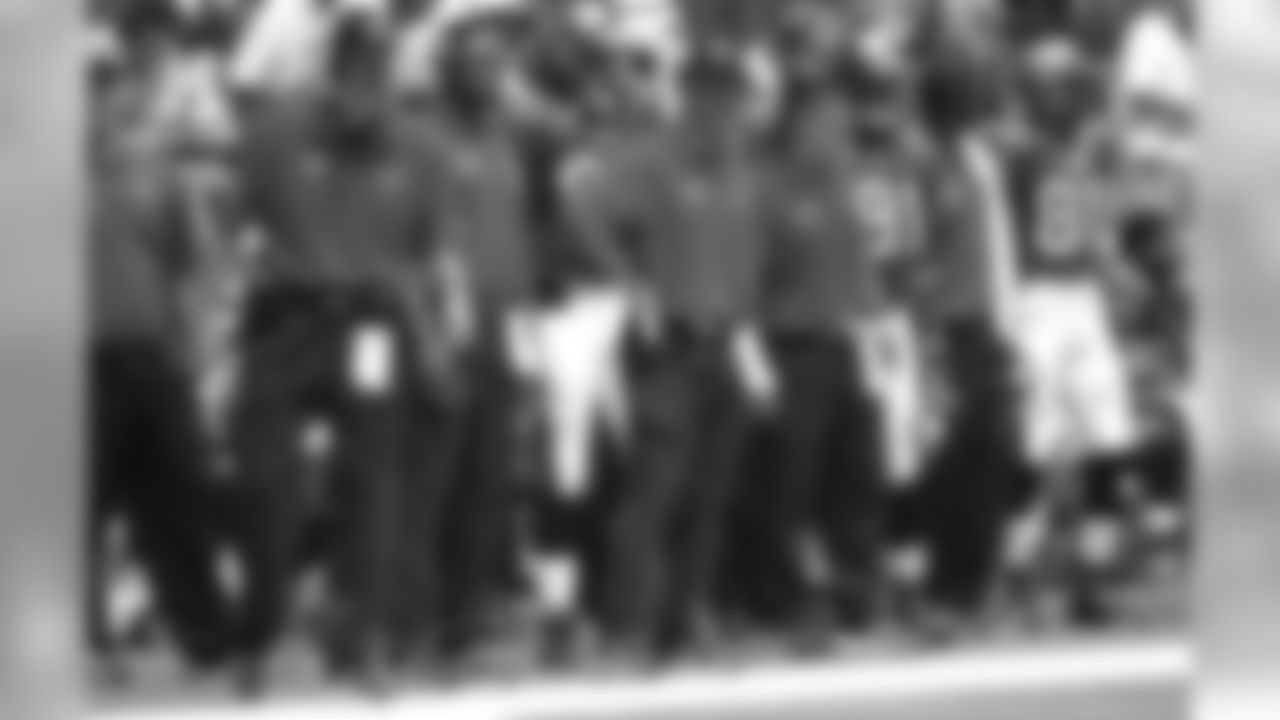Pictures from Tony Dungy's career with the Buccaneers.







































The sparkling numbers on the football resume that got Tony Dungy into the Hall of Fame are his 148 victories, his 66.8% regular-season winning percentage and his 11 playoff trips in 13 seasons as an NFL head coach. The obvious peak in all of that winning was Super Bowl XLI, which his Indianapolis Colts took over the Chicago Bears at the end of the 2006 season, making Dungy the first African-American head coach to raise the Lombardi Trophy.
That '06 campaign is not the only one that Dungy holds particularly close to his heart, however. In the process of working on the speech he will deliver at his August 6 enshrinement in Canton, the former Tampa Bay Buccaneers head coach has had occasion to relive his more than three decades as an NFL player and coach, and one of the years that he remembers particularly warmly is 1997. That was his second season at the Buccaneers' helm, and his second season as a head coach in general.READ: DUNGY HEADED TO HALL OF FAME
In fact, after the wonderful surprise of learning he had made the Steelers' roster as a longshot undrafted rookie in 1977, Dungy cited 1997 and 2006 as his fondest NFL memories. The Buccaneers broke out of a long run of mediocrity in 1997 with a 10-6 record and their first trip to the playoffs in 15 years, but what made the season particularly memorable for Dungy was the reaction of the Bay area community.
"The '97 season in Tampa, our first playoff year, when the people kind of caught fire and got behind the team, that was an awesome year and one of those times you never forget because it was so new," said Dungy. "And then obviously the Super Bowl year of '06, capping that off and playing against Lovie Smith and his team, and finally winning it, realizing that we had accomplished what we had set out to do, and how much joy there was in the city. That was a special moment, too."
Tampa Bay won its first five games in 1997 behind an emerging defensive powerhouse led by Derrick Brooks and Warren Sapp, two other recent Hall of Fame inductees. After a dip to 8-8 in 1998, Dungy's Bucs went back to the playoffs in 1999, 2000 and 2001, and in '99 came within a few minutes of the franchise's first Super Bowl appearance. Dungy's Colts qualified for the postseason every year from 2002-08, too, which makes the 1996 Bucs team the only other one he did not take to the playoffs.
However, that '96 season has, in retrospect, become a big part of the lore of the most successful run in franchise history. Dungy's first team started out with five losses and had a 1-8 record in November. Dungy famously counseled patience to his players and stuck to his plan, and the '96 Bucs won five of their last seven to set up the 1997 breakout. Now, however, Dungy admits that it was hard to complete beat back his own doubts at the time, at least in terms of the expected timetable for success.
"I can't say that I never doubted," he said with a laugh. "I went in with really high expectations. I thought we had a group of talented players and I thought I had the right system and we were going to win. So when you don't win, it catches you by surprise. I was very surprised to be 0-5, but the thing that happened was we had a coaching staff that really believed in how we were doing it and we were able to stay together and not panic.
"We won our sixth game and then we lost three more, and that's when you start to doubt, not that it's going to happen but, 'When will it happen? How fast is this going to turn around?' I could see that we were making progress. We were in games in the second half of that stretch, we just weren't making the plays to finish them. I knew we could do that, but you wondered how long the players would hang in there, and how long they would continue to believe without seeing the results. So what I kept trying to do was show them that we are making improvements, we are winning."
Dungy had learned this approach from legendary Steelers coach Chuck Noll, and from stories imparted by Pittsburgh star defensive end Joe Greene about a similar experience. And when the Buccaneers won their second game of '96 in overtime over the Raiders, he (correctly) believed that his team had gotten over the hump.

"From then on, we did start to see that success in that win column," said Dungy. "But I will have to say winning one game in three months was tough duty, and it didn't look good at the time. You certainly wouldn't have thought Hall of Fame at that point."
Dungy retired from coaching after the 2008 season and has since moved back to Tampa with his family. He calls the Bay area their "home base." For reasons that extend beyond the success his Buccaneer teams enjoyed, Dungy remains a very popular figure in that community, as do some of the cornerstone players of his Buc era. Like the '97 season that drew the Bay area together, the impact his teams had on the community is also one of the most cherished aspects of his Hall of Fame career.
"I just never felt that our only job was to win," said Dungy. "That's our primary job, but again, going back to my time with the Steelers, Mr. Rooney, Dan Rooney, Chuck Noll, they just instilled that in us, that football was a job but it was a part-time job. It wasn't your full-time job. It wasn't the only thing that you would be accountable for, and you had to be part of the community, part of the fiber of the city. I just think that's really important.
"I tried to pass that down to our players and fortunately in Tampa we had some young men who embraced that. I look now and I'm still gratified by guys like Derrick Brooks, who started a charter school there, and Warrick Dunn, who's providing homes for single moms. We had so many players like that who really embraced that challenge. They became part of the fiber of the city. I think people respect that and it's been important; it was important to me. That was a big part of what I wanted to do when I came there in 1996, and it's gratifying to see that it did take place."






















